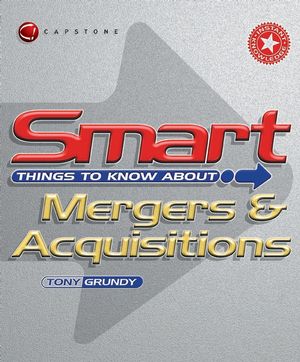Smart Things to Know About Mergers and AcquisitionsISBN: 978-1-84112-086-7
Paperback
256 pages
April 2003, Capstone
 |
||||||
Chapter 1 – Introduction – Acquisitions and
Growth.
- Acquisition logic and growth – the acquisition culture.
- Acquisitions strategy and business growth.
- The logic of acquisitions and routes to growth.
- Acquisitions, alliances and organic development.
- How acquisitions can add, dilute or destroy shareholder value.
- Acquisitions and shareholder value (1) – types of acquisitions.
- Acquisitions and shareholder value (2) – segmenting the value.
- The acquisition process.
- Integrating management perspectives – strategic, financial, organisational, tax, legal.
- Alternatives to acquisition – alliances and organic development.
- Divestment.
- Structure of the book.
- Summary.
Chapter 2 – The Acquisition Strategy.
- Introduction – championing the strategy.
- Strategy and objectives.
- Gap analysis – where do acquisitions fit in?
- Acquisition options.
- Strategic and financial attractiveness, implementation difficulty, uncertainty and risk, and stakeholder acceptability.
- Determining criteria – do’s and don’ts.
- Detailed evaluation – external.
- BMW and Rover case study.
- Detailed evaluation – internal.
- Summary.
Chapter 3 – Search.
- Introduction.
- Different search processes.
- Approaching your target.
- Summary.
Chapter 4 – Acquisitions – Strategic Due Diligence.
- Introduction.
- Evaluation, strategic attractiveness – the GE grid.
- Financial attractiveness.
- Evaluating implementation difficulty.
- Uncertainty and risk.
- Stakeholder acceptability.
- Summary.
Chapter 5 – Gaining the Overview – Success in Due Diligence.
- Introduction.
- Markets and marketing.
- Products and services.
- Technology and IT
- BMW and Rover case (continued).
- Operations and people.
- Manufacturing.
- Summary.
Chapter 6 – Financial Evaluation.
- Segmenting the value of an acquisition.
- Bases of valuation – earnings, assets, discounted cash flows.
- Price-earnings ratio.
- Assets backing.
- Discounted cash flows.
- Scenarios and uncertainty and risk analysis.
- Links to the negotiation process.
Chapter 7 – Managing the Deal.
- Introduction – acquisition options and bargaining power.
- Understanding deal-making agendas.
- Deal scenarios.
- Deal-making do’s and don’ts.
- Funding the acquisition.
- BMW and Rover case (continued).
- Summary.
Chapter 8 – Acquisition Integration.
- The role of the acquisition champion.
- Integration success and failure.
- Integration strategies – the alternatives.
- Communication issues and the BMW/Rover case (continued).
- Project managing integration.
- Evaluating success.
- Post acquisition learning and review.
- Summary.
Chapter 9 – The Champneys Case.
- Introduction and background.
- Acquisition integration strategy – options.
- The integration process.
- The integration plan.
- Managing the integration – the dynamics.
- Case postscript.
- Summary.
Chapter 10 – Conclusion.
- The role of acquisitions – a review.
- Diagnosis of your own skills and weaknesses.
- Acquisitions and your career.
Appendix 1.
Granada and Forte case study.



